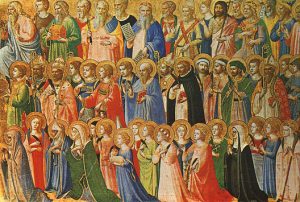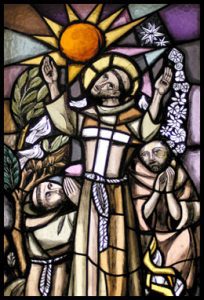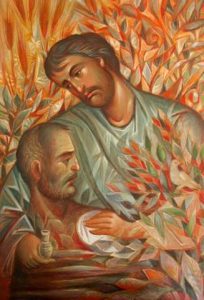[fruitful_tabs type=”default” width=”100%” fit=”false”]
[fruitful_tab title=”First Companions”]
First Companions on the Journey
 Divine Companionship
Divine Companionship
“The dignity of man rests above all on the fact that he is called to communion with God. This invitation to converse with God is addressed to man as soon as he comes into being. For if man exists it is because God has created him through love, and through love continues to hold him in existence.” (Catechism#27)
The Catechism tells us that God has been communicating with us from the very first moment that we came into being! This means that God is with us from the very beginning of our life at conception. Our First Companions on the journey of life, then, are the Triune God: Father, Son, and Holy Spirit. They are with usand as a grace of our Baptism, they dwell within us. The Catholic mystic, Julian of Norwich said “God is closer to us than our own soul.”
“In the fullness of time, the Son of God took flesh and dwelt among us.” (John 1:14) He shared our human life. He called companions to journey with him, the disciples, and he still calls us to follow him and be his companions. He also shares with us his “Best Friend,” the Holy Spirit, who is the Helper, and who is called in the original Greek of the New Testament the Parakletos, which means “one called to our side to help us,” like a Friend.

Family Companionship
From the Book of Genesis we learn that “it is not good for the man (the human) to be alone.” (Genesis 2:18) We are created for relationships and our life cannot be understood apart from the relationships of our lives.
Our first relationships are normally with our mother and father and other family members. We quickly form additional relationships with other children, and this is the start of a life-long capacity to form social relationships. Our friends can be some of our most cherished companions in life.Many discover the intimate companionship of marriage. If one is celibate, the companionship of friends and even a religious community can assure that one is not alone in life. Professed Religious, Brothers and Priests witness to the perennial value of a life in community, just as married couples with children give a similar witness regarding the family as community.
Christian married couples and Christian families provide companionship to one another in following Christ.
[/fruitful_tab]
[fruitful_tab title=”Friendship”]
Friendship: A Practice of Love
 Beloved-Disciple 2 640 x 480Jesus summed up his relationship with his 12 disciples in this way: “I no longer call you servants, for the servant does not know what his master is doing; but I have called you friends.” (John 15:15a; emphasis added)
Beloved-Disciple 2 640 x 480Jesus summed up his relationship with his 12 disciples in this way: “I no longer call you servants, for the servant does not know what his master is doing; but I have called you friends.” (John 15:15a; emphasis added)
Our Western society tends to not appreciate the distinctiveness of true friendship. We might call almost anyone a friend when we mean a familiar acquaintance. Especially alarming is the Internet social networking, like Facebook, where one collects “friends,” often a huge number of such “friends.” Facebook and other social media can be beneficial; but true friendship demands a knowledge, trust, intimacy and communication that can only be sustained in a few good relationships deserving to be called true friendship.
The test of true friendship is defined by Jesus: “Greater love has no one than this, that one lay down his life for his friends.” (John 15:13)
Good friendships, especially ones where you can open up your heart and mind, including matters of your Spiritual Journey, nourish our soul and provide food for our journey of love. In an article titled “Plato, Thomas and the Daring Ethics of Friendship,” Mark Vernon writes that “friendship is the best school of love for human beings: within the ambivalence of friendship, Christians can practice the habits of divine love so it becomes an overarching principle in their lives.”
A particular type of deep friendship is of course found in marriage, or ideally so. Married love is supposed to share one feature no other type of friendship is to share: exclusive sexual intimacy. Married love, however, does not exhaust the need for other complementary friendships which teach us how to love as Jesus loves us as friends. The Bible contains many examples of deep friendships between men and women and between men and between women. The lives of the saints also contain many examples of true and inspiring friendships.
[/fruitful_tab]
[fruitful_tab title=”Other Christian Companions”]
Catholic and Other Christian Companions
Since his Resurrection, Christ is united to those who are baptized into his Body the Church. He is the Head or Shepherd of his Body the Church.The union we share with him is at our deepest core, his Holy Spirit united to our spirit. “But whoever is joined to the Lord becomes one spirit with him.” (1 Corinthians 6:17b) This real Spiritual union between Christ and his Body the Church constitutes “the Whole or Total Christ.” Therefore, if we have Christ as our Companion, we have also the community of his Church.
Catholics of course will desire to have Catholic companions on the Catholic Spiritual Journey. Some of these companions might be friends, which is desirable, but friend or not, they are still on the same journey as we are, if we are serious about the Catholic Spiritual Journey.
Our awareness of these Catholic companions is renewed every Sunday at the Sunday Mass. There we are reminded that we are in communion with the Catholic Church and with all those who belong to the Catholic Church under the leadership of the Pope and Bishops. This communion is made visible by our gathering together on Sunday and receiving sacramental Communion together: Christ’s risen Body and Blood under the appearance of bread and wine. (Note: the word companion literally means one with whom one shares bread)
Other Christians can also be companions with us; though they are not in full communion with us, still we share that bond with Christ established by our Baptism into his life.

[/fruitful_tab]
[fruitful_tab title=”Human Family”]
Companions with the Human Family
Other good people, especially those who believe in God, may be companions also.
“God, who has fatherly concern for everyone, has willed that all [people] should constitute one family and treat one another in a spirit of brotherhood. For having been created in the image of God…all [people] are called to one and the same goal, namely God Himself.” (Second Vatican Council, Pastoral Constitution on the Church in the Modern World #24)
Catholics and Christians also fully share the human condition with all the human family. One of the most profound and beautiful passages from the Second Vatican Council states:
“The joys and the hopes, the griefs and the anxieties of the [people] of this age, especially those who are poor or in any way afflicted, these are the joys and hopes, the grief and anxieties of the followers of Christ. Indeed, nothing genuinely human fails to raise an echo in their hearts. For theirs is a community composed of men [and women]. United in Christ, they are led by the Holy Spirit in their journey to the Kingdom of their Father and they have welcomed the news of salvation which is meant for every man [and woman]. That is why this community realizes that it is truly linked with mankind and its history by the deepest of bonds.” (Ibid#1)
[/fruitful_tab]
[fruitful_tab title=”Saints”]
Saints as Companions
Catholics also share companionship with those believers who have died and live in heaven, including the angels and saints, and Mary the Mother of Christ. They are “the community of the beautiful,” models of faith, and the holy ones share with us the Eucharistic celebration in the Communion of Saints.
 The Catechism says:
The Catechism says:
“Being more closely united to Christ, those who dwell in heaven fix the whole Church more firmly in holiness. They do not cease to intercede with the Father for us, as they proffer the merits which they acquired on earth through the one mediator between God and men, Christ Jesus… So by their fraternal concern is our weakness greatly helped.” (Catechism#956)
“Just as Christian communion among our fellow pilgrims in this life brings us closer to Christ, so our communion with the saints joins us to Christ, from whom as from its fountain and head issues all grace, and the life of the People of God itself… May we also be their companions and fellow disciples!” (Catechism #957)
Pope Benedict XVI has beautifully expressed our communion with the heavenly companions:
“There are very dear people in the life of each one of us to whom we feel particularly close, some of whom are already in God’s embrace, while others still share with us the journey through life: they are our parents, relatives and teachers; they are the people to whom we have done good or from whom we have received good; they are people on whom we know we can count.
“Yet, it is important also to have ‘traveling companions’ on the journey of our Christian life….I am also thinking of the Virgin Mary and the Saints. Everyone must have some Saint with whom he or she is on familiar terms, to feel close to with prayer and intercession but also to emulate. I would therefore like to ask you to become better acquainted with the Saints, starting with those you are called [named] after, by reading their life and their writings. You may rest assured that they will become good guides in order to love the Lord even more and will contribute effective help for your human and Christian development.” (Pope Benedict, General Audience 8/25/10)
[/fruitful_tab]
[fruitful_tab title=”Creation’s Companionship”]
Creation’s Companionship
Finally, we must not forget that we also share our journey with the good creation. St. Francis of Assisi spoke of a brotherhood and sisterhood with created realities: “Brother sun,” “Sister moon,”  “brother wolf,” “sister birds,” etc. St. Francis was not speaking only poetically, but he had a real sense of the relationship that arises from having One Creator and all of us being creatures of our God.
“brother wolf,” “sister birds,” etc. St. Francis was not speaking only poetically, but he had a real sense of the relationship that arises from having One Creator and all of us being creatures of our God.
The Catechism celebrates such relationships within creation:
 “God wills the interdependence of creatures. The sun and the moon, the cedar and the little flower, the eagle and the sparrow: the spectacle of their countless diversities and inequalities tells us that no creature is self sufficient. Creatures exist only in dependence on each other, to complete each other, in the service of each other.” (#240)
“God wills the interdependence of creatures. The sun and the moon, the cedar and the little flower, the eagle and the sparrow: the spectacle of their countless diversities and inequalities tells us that no creature is self sufficient. Creatures exist only in dependence on each other, to complete each other, in the service of each other.” (#240)
We are to care for the creation of God, as God’s stewards of the earth. We are to care for the environment and to treat animals ethically. It is also the experience of many that pets can enrich and provide their own form of companionship to us on life’s journey.
[/fruitful_tab]
[fruitful_tab title=”Natural vs. Moral Suffering”]
Natural Suffering vs. Moral Suffering
Natural Suffering
It may be helpful to distinguish two major types of suffering: “natural suffering” and “moral suffering.” By natural suffering, we mean suffering which is not apparently caused by human actions; rather this kind of suffering arises from forces of nature, disease, and the decay and natural death of all living things. The Catechism refers to this kind of suffering, which affects humans and all creation, as being the consequence of the way the universe is incomplete in nature:
Catechism#302: “Creation has its own goodness and proper perfection, but it did not spring forth complete from the hands of the Creator. The universe was created in a state of journeying (in statu viae) toward an ultimate perfection yet to be attained, to which God has destined it. We call divine providence the dispositions by which God guides his creation toward this perfection…”
We may indeed ask why God created the world in this state of journeying? No simple answer can answer this question, but it seems to have something to do with our growth as individuals and as a species. There is something necessary in this natural suffering, though it is legitimate to attempt to alleviate this suffering and even cure it, as in the case of disease.
Moral Suffering
Moral suffering is that suffering caused unnecessarily by human sinfulness. It is an act of human freewill, but also affected by evil influences: in society and spiritually (the diabolic). At some point in the beginnings of the human race, humans chose to do evil and ever since there is a dimension to human nature that is “God-resistant,” i.e. humans refusing to love as God loves us. This is called in the Christian Tradition, “Original Sin.”
In almost every way, this kind of suffering, caused by immoral behavior, is the worst of suffering because it is unnecessary and senseless. Christ came to free us from sin and make us into a new creation. It is in God’s plan that one day all sin will be no more and even natural suffering will come to an end, as the human race reaches full spiritual and moral perfection. Meanwhile, we are called to have God’s response to suffering of all kinds and so to help one another alleviate suffering in this world.
[/fruitful_tab]
[fruitful_tab title=”Justice and Compassion”]
God’s Call to Justice (Right Relationship) and Compassion
Throughout their history, humans are called by God to be in right relationship with him, with one another and with creation. In the Bible this is called justice; it recognizes the rights and responsibilities we have as persons to one another, i.e., these right relationships depend on what is good for humans, regardless of religious affiliation. Nevertheless, those who believe in an All Good God have religious justification also for doing what is good for others.
This call to live in justice’s right relationships also includes compassion for the other, as God has compassion. There is nothing more scandalous in the eyes of the world than Christians who are not compassionate.
These are two ways which God addresses the suffering of the world: through compassion and justice. The Prophet Micah proclaims: “God has shown you what is good, and what does the Lord require of you, but to do justice, to love with compassion, and to walk humbly with your God.” (Micah 6:8)
When anyone is suffering from any cause, God has compassion on that person and so should we. Compassion means “to suffer with another”. The Bible says that the Lord hears the cry of the poor and God responds to that cry (see Job 34:28), often God hears and acts through God’s very own People, a People God has claimed as his own.

The Ultimate Compassion of God is shown when Jesus, the Son of God, suffers because of our sins on the Cross. “The Church, following the apostles, teaches that Christ died for all men [and women] without exception: There is not, never has been, and never will be a single human being for whom Christ did not suffer.” (Catechism #605)
The other response to suffering which arises from sin is to do justice in the face of injustice. We need to understand Biblical justice as much richer than mere legalism. In the Bible justice means right relationships; it is sometimes translated also as “righteousness.”
To be in right relationship with God and one another, we must turn away from sin, from that evil which harms others and causes their suffering. Justice-as-right-relationships apply to our personal relationships as well as our social relationships.
The Catholic Church has a fairly well-developed teaching regarding social justice, also sometimes referred to as “social teaching.” We are called not only to correct personal vices but also social structures which make sin more easily committed. Those who are poor are especially vulnerable to being treated unjustly because they often lack social and political power to protect themselves. An essential component to stopping moral suffering is the repentance and forgiveness of sins which Jesus came to establish in us and in our world through his Cross and Resurrection. He died for us so that we might die to sin with his help; and he rose from the dead so that we might rise to a new life in him, to love one another as he loves us.
God is quite clear to warn us of the consequences of not helping the poor and those who are oppressed: we may forfeit our salvation (See Matthew 25:41-46). We can be very devout in prayer and even live honestly, but without compassion and justice, the essential components of God’s love, we are far from the Kingdom (the Rule) of the God who is love.
[/fruitful_tab]
[fruitful_tab title=”Called to be Martyrs?”]
Are Christians Called to be Martyrs?
 Those Christians who suffer from natural suffering or as a result of another’s sin against them are in a certain way called to be martyrs. I hasten to add that this in no way means that they should not attempt to get whatever help is available for their natural sufferings from illness or misfortune; neither does it mean that they should not resist moral evil committed against them in the ways available to them.
Those Christians who suffer from natural suffering or as a result of another’s sin against them are in a certain way called to be martyrs. I hasten to add that this in no way means that they should not attempt to get whatever help is available for their natural sufferings from illness or misfortune; neither does it mean that they should not resist moral evil committed against them in the ways available to them.
Nevertheless, when we face unavoidable suffering, our challenge is to remain faithful to God, like the martyrs of the Church who remained faithful to Christ even to the point of death, rather than be unfaithful. We may not think we have it in us to be a martyr like those admired by the Church; but the Spirit helps us in our weaknesses and we can think of this as beicoming “ordinary martyrs,” by depending upon God’s strength to help us face and go through suffering with Christ at our side. (This is how all martyrs endure when they journey through suffering).
A particular example of the Spirit’s help in our suffering from serious illness and sometimes the weaknesses of old age is found in the Sacrament of the Anointing of the Sick:
“This is why, through the sacrament of anointing, Christ strengthens the faithful who are afflicted by illness, providing them with the strongest means of support.” (Introduction, The Pastoral Care of the Sick#5, emphasis added)
“This sacrament gives the grace of the Holy Spirit to those who are sick: by this grace the whole person is helped and saved, sustained by trust in God, and strengthened against the temptations of the Evil One and against anxiety over death. Thus the sick person is able not only to bear suffering bravely, but also fight against it.” (Ibid.#6)
The Sacrament of Anointing, among other helps, gives strength to the believer to have renewed faith and trust in God’s help and mercy. The great question which the believer faces is not just “Will I get well again?” (we can hope so, but it’s not guaranteed in this life) but “How can I be a firm witness to Christ in this suffering?” The same applies to other kinds of suffering beyond the scope of the Sacrament for the Sick.
The Church calls us to help the sick and suffering in every way we can, especially in staying with them in their time of need.
[/fruitful_tab]
[fruitful_tab title=”The Good Samaritan”]
The Good Samaritan:
Model for Helping Others on the Journey
The Parable of the Good Samaritan (Luke 10:25-37) captures our imagination and indeed gives us a profound image of how we are to help others on the journey.
 The parable describes a number of people on a journey: an unnamed man (he can be anyone); a Jewish priest, and a Levite (a kind of Temple assistant); and a despised-by-Jews Samaritan. The unnamed man is robbed, beaten, and left for dead by the side of the road by robbers. We hear then how the priest came along, but did nothing, continuing his journey uninterrupted. The Levite did the same. Only the despised Samaritan stopped and helped the suffering man. Jesus praises the Samaritan, saying he acted as a neighbor to the suffering man and Jesus says to us: “Go and do the same.” (Luke 10:37)
The parable describes a number of people on a journey: an unnamed man (he can be anyone); a Jewish priest, and a Levite (a kind of Temple assistant); and a despised-by-Jews Samaritan. The unnamed man is robbed, beaten, and left for dead by the side of the road by robbers. We hear then how the priest came along, but did nothing, continuing his journey uninterrupted. The Levite did the same. Only the despised Samaritan stopped and helped the suffering man. Jesus praises the Samaritan, saying he acted as a neighbor to the suffering man and Jesus says to us: “Go and do the same.” (Luke 10:37)
Father Thomas Rosica comments upon this parable:
“The Good Samaritan shows us what compassion and commitment are all about. He could have easily passed by on the other side. He could have closed his heart and refused to respond to a genuine need. But he stopped and knelt down beside the stranger who was hurting. At that moment, a neighbor was born. Everyone who stops beside the suffering of another person, whatever form it may take, is a Good Samaritan. This stopping and stooping, this pausing and kneeling down beside the suffering, is not done out of curiosity but out of love. The Samaritan’s compassion brings him to perform a whole series of actions. First he bandaged his wounds, then he took the wounded man to an inn to care for him and, before leaving, he gives the inn keeper the necessary money to take care of him .” (www.saltandlighttv.org)
Again we recall the simple, but very challenging command of Jesus: Go and do the same.
At Holy Faith, our particular mission is to build together a community of compassion in Christ. We practice or try with the Spirit’s help to practice a stewardship of compassion. We have been shown compassion by Christ in our needs. Our companions, and hopefully our parish, give us encouragement and compassion (suffers with us) in our needs. We are to do the same, for “the love of Christ compels us” (2 Corinthians 5:14) and St. Paul tells us in the same letter:
“Blessed be the God and Father of our Lord Jesus Christ, the Father of compassion and God of all encouragement, who encourages us in our every affliction, so that we may be able to encourage those who are in any affliction with the same encouragement…” (2 Corinthians 1:3-4)
[/fruitful_tab]
[/fruitful_tabs]
